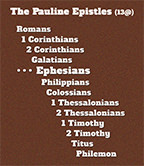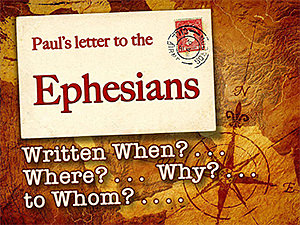
Facilitated by Warren Camp
Brand-new series: You can study on your own or with others.
“Ephesians” Introduction: Questions / Answers
The book of “Ephesians” has been cited by many theologians as possibly being: “a literary masterpiece,” “the crown and climax of Pauline theology,” “a distilled essence of the Christian religion,” “the most-authoritative and most-consummate compendium of our holy Christian faith,” “full of gospel-packing punch.” Because of its significance, as well as its elegance, this unique letter that Apostle Paul wrote to the church body of believers living in Ephesus, “Ephesians” might very well be the greatest book in the Bible.
This is one of the best-known and most-frequently-read books in the entire canon of Scripture. In the first half of this apparent circular letter that Paul addressed to the Ephesians but intended to be shared with the church as a whole, he gives us almost nothing but gospel explanations and reminders as he describes in full measure the breathtaking blessing believers receive from Christ. The second half is almost entirely gospel application filled with extraordinary suggestions, followed by grace-specific orders that powerfully encouraged believers then in Ephesus [and everyone today] to live renewed lives, thanks to Jesus Christ.
I’ll begin this introduction by acknowledging this letter’s author and then advise you of when, where, to whom, and why this letter was written. Then I’ll bring your attention to the letter’s exceptional characteristics, followed by viable application steps we ought to adopt. I hope that I’ll effectively set the tone for this study and discussion by motivating you to take the essence of Paul’s epistle message very earnestly.
Questions about “Ephesians”. . .
Who wrote this letter to the Ephesians?
From the letter’s start — v. 1–2 — we learn the author of the epistle to the Ephesian believers. Paul names himself as the sole author, which is also true of his letters to the Romans and the Galatians. [Click to enlarge the graphic, left, to see all thirteen of Paul’s epistles.]
We might be surprised that Timothy didn’t take some part in writing this letter, especially since Timothy is cited as a co-writer of Paul’s three of the four so-called “Prison Epistles” (i.e., Philippians 1:1; Colossians 1:1; and Philemon 1). Although he wasn’t a co-author, we’ll later see that Timothy will play a vital role in leading the church body in Ephesus (see 1 Tim. 1:3–5).
The Pauline Epistles contain much of the doctrine the Christian faith is built upon, especially in relationship to salvation. In this epistle, his original readers and certainly us today can see that Paul’s writing enhances his influence, position, and high regard, not simply as a church leader but one who’s fulfilled the fundamental role of establishing this church.
What’s so special about the “Ephesians” epistle?
We’ll answer that question by considering the characteristics of what’s sometimes called “the book of Ephesians.” Pastor and teacher Bob Deffinbaugh provides this helpful breakdown.[1]
(2) Ephesians is not a “personal epistle.”
(3) Ephesians is not a “problem-solving epistle.”
(4) Ephesians is not a “didactic (teaching) epistle.”
(5) Ephesians is not a book that tells us how to be successful or effective.
(6) Paul is not preaching or teaching in Ephesus but praising God for who He is and what He has done through Jesus.
(7) Ephesians has proven to be greater than the minds of those who have studied it.
(8) Ephesians changes our “citizen of this world” perspective to that of a “citizen of heaven.”
(9) Ephesians seeks to change our orientation from one which is man-centered to one which is God-centered.
(10) To sum up the essence of the contribution of Ephesians, this epistle draws our attention to the glory of God.
What’s unique about the city of Ephesus?
Ephesus was the most important city in western Asia Minor (now Turkey). Because it was at an intersection of major trade routes, Ephesus became a commercial center. It boasted a pagan temple dedicated to the Roman goddess Diana (Greek Artemis; cf. Acts 19:23–32). Paul made Ephesus a center for evangelism for about three years, and the church there apparently flourished for some time, until it found itself needing the warning Apostle John had made directly to in Revelation 2:1–7.
The city was an emporium with few equals in the world. Certainly no city in Asia was more famous or more densely populated. It ranked with Rome, Corinth, Antioch and Alexandria among the empire’s foremost urban centers. In Ephesus, Paul preached to large crowds of people. We see in Acts 19:26 that its silversmiths, led by idol-maker Demetrius, complained that Paul had influenced large numbers of people there causing the fabrication and sale of silver idols to diminish. And, in one of the most dramatic events recorded in the NT (19:28–34), a marketing campaign turned into a riot because silversmiths and other craftsmen were losing business because so many in Ephesus were turning to Jesus. Apostle Paul escaped a huge mob in a theater that could hold 25,000 people!
When, where, to whom, and why was this letter written?
When? Paul wrote his first epistle in AD 50–52 to the Thessalonians, chiefly centering it on Jesus’ return. During Paul’s third missionary journey (AD 55–56), he wrote “Corinthians,” “Galatians,” and “Romans,” all clearly defining the meaning and purpose of the cross. In AD 60–62, during Paul’s Roman imprisonment, he wrote what we call his four prison epistles: “Colossians,” “Philemon,” “Philippians,” and “Ephesians.” Because Paul mentions his imprisonment in this letter (Eph. 3:1; 4:1; 6:20), it can be dated c. AD 62, during house arrest (Acts 28). It was hand-delivered by Tychicus to the church body (6:21–22).
Briefly at the end of his second missionary journey, and then for more than two years on his third missionary journey, Paul ministered to the church at Ephesus as a witness to Jews; but after three months, the Jews who refused to believe caused trouble. He then went to a lecture hall in Ephesus where he taught daily for two years, getting his message told throughout the province of Asia. Large numbers of Jews and non-Jewish Gentiles believed (Acts 19:8–10).
Where? Interestingly, Paul — the great apostle to the Gentiles — at the close of his third missionary journey, wrote this letter while he was a physically chained prisoner under house arrest in Rome (AD 60–62). It’s remarkable that Luke devoted more than a quarter of his Acts volume to the telling of the story of Paul’s imprisonment and connected events. In the last chapters concerning his imprisonment, Paul met three Roman officials: Lysias the military tribune, and Felix and Festus, who were governors (procurators) of Judea and Samaria. Lysias and Festus positively pronounced Paul innocent (23:29; 25:25; 26:31) while Felix showed Paul many great favors and seemed willing to set him free, if it hadn’t been for his fear of the Jews and his hope of a bribe (24:26). So Paul was never condemned by a single Roman judge, though he remained imprisoned in Caesarea for two years, then in Rome for another two years.
To Whom? “Ephesians” appears to have been written to a broad group of individuals, rather than a few believers or a specific church. How Paul came to the city of Ephesus is a captivating story, which Luke recounts for us in Acts 19. Ephesus was a huge city that attracted many to collectively and individually worship a majority of Greek and Roman gods. However, Paul had an effective missionary presence there for at least two years while converting many to Christianity. A few years later, after the Romans arrested and imprisoned Paul, he wrote an important letter to the church body living in and around Ephesus.[2] Note: “Ephesians” isn’t the first epistle written to the Ephesian body of believers. Paul refers to a previous, shorter letter that he wrote to them before writing this one (3:1–3).
Why? Unlike epistles written to specific churches, this one doesn’t address specific problems unique to a local congregation. Instead, Paul confronted essential themes pertaining to the believer’s relationship with Jesus, as a member of his church body. Paul expressed a number of items in his prayer for his letter’s readers (Eph. 1:15–23). He wanted them to be able to correctly answer three key questions: (1) What is the hope of God’s calling? (v. 18a); (2) What are the glorious riches of God’s inheritance in his holy people? (v. 18b); and (3) What incomparably great power does God give to faithful believers (v. 19).
Added to those three essentials, Paul gives three themes for “Ephesians,” which we’ll appreciate in upcoming passages: (1) God’s generous gift; (2) how we’re to walk worthily after we receive his gift; and (3) how we’re to stand firm when we face spiritual evil.
What message does Paul convey in this letter?
Unlike several of Paul’s twelve other letters, “Ephesians” doesn’t address a particular error or heresy. He wrote this letter to expand the horizons of his readers so that they might understand better the dimensions of the Lord’s eternal purpose and grace, thereby appreciating the high goals God has for his church body.
My NIV study Bible states that Paul’s letter opens with a sequence of statements about God’s blessings, carefully interspersed with a remarkable variety of expressions that draw attention to God’s wisdom, forethought, and purpose. Paul emphasizes that we’ve been saved, not only for our personal benefit, but also to bring praise and glory to God. The climax of God’s purpose: “…when the times reach their fulfillment — to bring unity to all things in heaven and on earth under Christ” (1:10). Because it’s crucially important that Christians realize this, Paul prays for their/our understanding (vv. 15–23). [Read Paul’s second prayer in 3:14–21.]
Having explained God’s essential goals for his church members, Paul then proceeds to show two steps toward their fulfillment: First, God has reconciled individuals to himself as an act of grace (2:1–10); Second, God has reconciled these saved individuals to each other, since Christ had broken down the barriers through his own death (2:11–22). But God has done something even beyond this: He has united these reconciled individuals in one body, the church. This is a “mystery” not fully known until it was revealed to Paul (3:1–6). Now Paul is able to state even more clearly what God has intended for the church; namely, that it be the means by which he displays his “manifold wisdom” to the “rulers and authorities in the heavenly realms” (3:7–13). It’s clear through the repetition of “heavenly realms” (1:3, 20; 2:6; 3:10; 6:12) that Christian existence isn’t merely on an earthly plain — it receives its meaning and significance from heaven, where Christ is exalted at the right hand of God.
Nevertheless, that life is lived out on earth where the practical daily life of the believer continues to work out God’s purposes. The ascended Lord gave “gifts” to members of his church to enable them to minister to one another and so promote unity and maturity (4:1–16). The church’s unity, under the leadership of Christ, foreshadows the uniting of “all things in heaven and on earth” under Christ. The new life of purity and mutual respect stands in contrast to the old way of life without Christ (4:16–6:9). Those who are “strong in the Lord” have victory over the evil one in the great spiritual conflict, especially through the power of prayer (6:18).
How familiar are you with these passages?
Do you recall key verses from your previous readings and studies of “Ephesians”? Here are a few, including Paul’s “Inspirational” verse that’s well known and often memorized: Eph. 2:10.
Strength: 1:19 3:16 3:20 4:13 6:10 …
Love: 2:4–5 3:17–19 4:2 5:2 5:25–26 …
Salvation: 1:7–8 1:13–14 2:5 2:8–9 …
Unity: 2:14–16 4:3 4:4–6 4:13 4:16 …
Faith: 2:8–9 3:17 4:5 6:16 6:23–24 …
Forgiveness: 1:7 1:14 2:13 4:31–32 5:1–2 …
How is “Ephesians” applicable for us today?

The epistle to the Ephesians carries a timeless message: Embrace our identity in Christ and live in unity with those around us. By applying these teachings in our daily lives, we’ll grow closer to our Lord and his many children. Several consider this epistle’s exhortations and recommendations to be suitable guidelines for Christ’s followers, successfully enabling us to live righteously in today’s world. Both the unity of purpose that it urges and the total conversion it demands remain ideals of the Christian church.
This circular letter deals with the unity of the church, as well as the need for Jewish and non-Jewish converts to Christianity to realize and prioritize their place in Christ, making it much more important than what they admired and acclaimed, based on their previous lifestyles and loyalties. The message is clear: Prior to following Christ, all were lost in their confusion and darkness. But, after finding Christ, a believer’s life must change entirely. All Christians should be reconciled to each other; their former worldly life must be left behind (2 Cor. 5:17).
“The book of ‘Ephesians’ hits on a wide range of moral and ethical behaviors, designed to ensure that believers are living up to our heavenly calling. As we continue in our faith from day to day, month to month, and year to year, the temptation to get comfortable will always exist. However, Paul presented the gift of God in Christ and the benefits we receive so clearly. As a result, we can’t help but ask ourselves if our lives reflect that reality as they should.
“How have you grown in your Christian life since you came to faith in Jesus Christ? The latter half of Ephesians makes clear that spiritual growth occurs primarily in community with others: iron sharpening iron (Proverb 27:17). Your Christian ‘walk’ (your daily life) is to be characterized by unity, holiness, love, wisdom, and perseverance with spiritual warfare.
“Maturity yields benefits in believers’ moral lives, but it extends far beyond that as well. Increased maturity benefits the community at large, leading us as Christians to present a more consistent witness to the working of God in our lives, as well as protecting us from the harmful divisions and quarrels that have plagued so many communities throughout history.[3]
Finally, here are seven ways we devoted believers in Jesus ought to intentionally and attentively apply this epistle’s Scriptures:
(1) Bound in unity to fellow believers, we must realize that the essence of maintaining one collaborative church body in accord that there’s “one body and one Spirit,… one Lord, one faith…” (Eph. 4:4–6).
(2) Having devoted ourselves to following Jesus, we’re to walk worthily — better yet, run! — on the road God called us to travel (4:1–3).
(3) Paul also tells his readers “to put off your old self… be made new in the attitude of our minds; and to put on the new self, created to be like God in true righteousness and holiness” (4:22–24).
(4) As God’s dearly loved children, we should strive to imitate him and “walk in the way of love, just as Christ loved us and gave himself up for us as a fragrant offering and sacrifice to God” (5:1–2).
(5) Living in a Christian household, God instructs us through Paul to make our marriage reflect and model the gospel account of Lord Jesus out of reverence for him (5:21–33).
(6) Parents and children are instructed to obey, honor, train, instruct, raise one another in discipline and instruction of the Lord (6:1–4).
(7) To fully and successfully resist the devil’s schemes, we’re to immediately and purposefully put on one or more pieces of protective gear the Lord provides every follower of his (6:10–20).
Apostle Paul’s Personality and Passion on His Missionary Journey in Ephesus
† Watch this video highlighting Paul in Ephesus — created by Our Daily Bread Ministries.
Intro Video: “Ephesians”
† Here’s a superb run-through video of this epistle, created by BibleProject.




